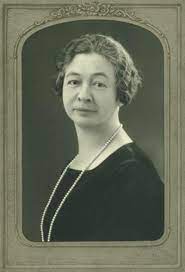Carolyn Campbell Pendray: A Tireless Trailblazer For Women In Politics
By Eileen Beran

Born in 1881 and raised in an era when women had no right to vote or serve in the state legislature, Carolyn Campbell Pendray was a trailblazer, making the most of her upbringing and doors that were beginning to open. During her childhood in Mount Pleasant she had no shortage of politically active family members as role models: Her grandfather was a state representative; her father, a farmer, was a state senator; and her mother was an activist for women’s suffrage. Pendray melded the family traditions of public service and women’s advocacy and added her own mark, becoming the first woman elected to the Iowa State Legislature and the first woman to serve in both the House and Senate.
Running against the odds
With Pendray’s mother to thank in some small part, women could first vote in 1920. Women were legally allowed to serve in the Iowa Legislature by 1926, when the word “man” was removed from the requirements to run. Wasting little time, Pendray entered the race for Iowa House two years later, in 1928.
During her campaign, a county newspaper, the Maquoketa Excelsior, suggested that only a man–and one who was respected and a safe choice–could be effective working with the all-male legislature. It also alleged that Pendray was ineligible because she didn’t pay property taxes. However, she had friends at another newspaper, the Jackson Sentinel, who set the record straight, citing Pendray’s participation in various organizations and clubs and her prior service as school superintendent. And if it weren’t enough that her husband likely paid taxes on their family home, the paper reminded readers that she personally owned a farm for which she did indeed pay property taxes. (Seems that tactics like “birtherism” are nothing new!) Pendray was successful and, as we say these days, flipped her traditionally Republican district Blue.
Accomplishments in a minority party
We might see the current Iowa House balance as lopsided, but during Pendray’s first term Democrats held just 14 of 109 seats. Regardless, Pendray had some notable accomplishments. With Republican member Linus Forsling (Woodbury County) she cosponsored a bill to recognize that a woman could be a legal head of household and to protect a woman’s sewing machine and poultry from debt collectors. These rights were groundbreaking in a day when husbands had near complete control over a family’s assets and women had virtually none. She also led several education-related bills.
Pendray achieved status on a national level when she and another Democratic House member, Ada Garner (Butler County), were instrumental in Iowa’s ratification of the child labor amendment to the US Constitution. The amendment would give Congress the power to regulate the labor of children under 18. Unfortunately, especially given state legislatures’ current dangerous push to loosen age limits and child worker protections, this amendment is still pending.
Pendray struck a blow to lax ethics practices. When she came to the Assembly, lobbyists were free to sit at the elbow of legislators and advise them on how to vote. During her Senate service when Democrats were in the majority, she was able to put in place a plan to rope off an area for lobbyists.
Pendray served two terms in the House. Then in 1932 she ran against an incumbent to the State Senate and was the first woman to be elected to that body as well. She retired from the Senate after two terms.
A lifelong activist
Pendray led an active life before and after her legislative service. Prior to marrying at age 39 she was a teacher for twenty years, including teaching summer classes at Iowa Wesleyan College in Mount Pleasant. In that day marriage often meant a woman’s occupation automatically became “homemaker,” which was the case for Pendray. However she never stepped back from service and involvement. When she and her husband lived in Ottumwa and then in Maquoketa, she participated in her church and, as previously mentioned, in several clubs. She served as Henry County school superintendent for seven years. Pendray was also active in the Democratic Party, chairing the Jackson County Central Committee and serving the Iowa State Central Committee as chair of her Congressional district.
After the death of her husband she moved back to Mount Pleasant in 1950. Two years later she ran again for House, unopposed in the primary but this time unsuccessful in the general election. She died in 1958 at the age of 76 and was posthumously inducted into the Iowa Women’s Hall of Fame in 1978.
It was said of Carolyn Campbell Pendray that she was “a strong, resolute woman who rarely gave up a fight.” Even as she had her own family members as examples, I hope Iowa Democratic women will take the example of her activism and willingness to fight against odds as inspiration to step into opportunities to serve in their communities and as lawmakers.
Sources
Hermann, Ann. “Carolyn Campbell Pendray,” Jackson Biographies. April 7, 2010.
O’Dea, Suzanne. “Pendray, Carolyn Campbell.” The Biographical Dictionary of Iowa.Pestka, Barbara.
“Politics was in her blood,” Bellevue Herald Leader. February 26, 2020.
Eileen Beran is a resident of Kalona, in Washington County, and ran for Iowa House in 2022. She is on the board of the Iowa Democratic Party Women’s Caucus and a member of the League of Women Voters.